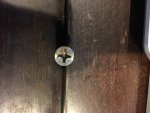Good screws generally do not rust, but manufacturers insist on using cheap products so lower quality stainless steel such as 304 instead of 316 or 316L. Also, if one is not consistent in using the higher quality stainless steel, then if it is in contact with lower quality metal, galvanic corrosion will accelerate the corrosion of such lower quality metal near the point of contact. The screws in my light rings have not corroded and they are now 12 years old. I have no sacrificial anode.
The little Zinc Anode at the light in the water WILL work if the anode is electrically connected to the light metal if that is connected electrically to the screws. When I said not to put the zinc into the water it wasn't because it wouldn't work but rather to avoid adding zinc ions to the water.
Very strange as the screws never started deteriorating near the point of contact, but just the heads, inside where the Philips head goes in. Then dripping on the head and staining the niche ring. My guess is that the pre-drilled holes may have not been sprayed properly (who knows), but for now good luck appears to be on my side. New ones are fine (keeping my fingers crossed).

That is what the old one looked like.

